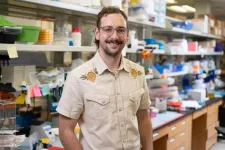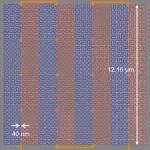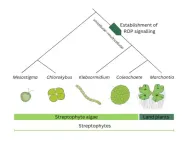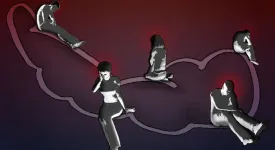(Press-News.org) (MEMPHIS, Tenn. – November 30, 2023) Immunotherapy using modified chimeric antigen receptor (CAR) T cells has greatly improved survival rates for pediatric patients with relapsed and recurrent leukemia. However, these therapies are not as effective in treating solid tumors and can have significant toxicity. Findings from St. Jude Children’s Research Hospital showed that adding a modular chimeric cytokine receptor to CAR T cells increased their efficacy in multiple solid tumor models. The study was published today in Nature Biomedical Engineering.
“We designed modular chimeric cytokine receptors and showed that they improve CAR T cells,” said first author Matthew Bell, Ph.D., formerly of the St. Jude Department of Bone Marrow Transplantation and Cellular Therapy. “From our models, this technology has the potential to broadly improve CAR T–cell therapy for solid tumors and brain tumors.”
CAR T cells are a patient’s own immune cells modified to target and kill cancer cells. Solid tumors generate anti-immune signals that turn CAR T cells off, rendering the treatment less effective. To - address this problem, scientists have combined CAR T cells with the injection of cytokines, which can cause significant unintended toxicities. The St. Jude system allows scientists to deliver the pro-immune signaling of cytokines only to the CAR T cells, eliminating systemic toxicity.
“Our system limits the effect of the cytokine signal to only engineered cells,” Bell said. “In turn, this reduces the chance of cytokine-related toxicity, and it provides a signal that these CAR T cells need to function effectively in a suppressive tumor microenvironment.”
A modular system benefits the antitumor activity of CAR T cells
“Our modular receptor system is an approach to improve current CAR T–cell therapy for solid tumors where the treatment has not been as effective as expected in early-phase clinical trials,” said corresponding author Stephen Gottschalk, M.D., St. Jude Department of Bone Marrow Transplantation and Cellular Therapy. “Our initial results showing improved tumor control in multiple model systems are promising.”
The St. Jude group replaced the extracellular domain of different cytokine receptors with leucine zippers to create constitutively active receptors. CAR T cells expressing any of these chimeric cytokine receptors had superior antitumor activity against multiple types of cancer in both cell lines and mouse models compared to conventional CAR T cells. While the chimeric cytokine receptors give a constant “on” signal to the CAR T cells, they do not induce unspecific CAR T–cell proliferation.
“We were happily surprised that these receptors turn on cytokine pathways just a little bit,” Gottschalk explained. “In the absence of tumor cells, the receptors improved CAR T–cell survival without expansion. To optimize the design and characterize our chimeric cytokine receptors, we worked closely with several St. Jude investigators, including Giedre Krenciute, Jiyang Yu, Junmin Peng, Hongbo Chi and Madan Babu.”
“Ultimately, we found a way to enhance the antitumor activity of CAR T–cells that is likely more effective and safer than injecting cytokines,” Bell concluded.
Authors and funding
The study’s other authors are Shannon Lange, Besian Sejdiu, Jorge Ibanez, Hao Shi, Xiang Sun, Xiaoxi Meng, Phuong Nguyen, Morgan Sutton, Jessica Wagner, Anil KC, Deanna Langfitt, Sagar Patil, Haiyan Tan, Ram Vinay Pandey, Yuxin Li, Zuo-Fei Yuan, Alejandro Allo Anido, Heather Sheppard, Peter Vogel, Jiyang Yu, Junmin Peng, Hongbo Chi, Madan Babu, and Giedre Krenciute, all of St. Jude; and Mitchell Ho, National Cancer Institute.
The study was supported by grants from the National Cancer Institute (P30 CA021765, F31CA250401-01A1, R01NS121249 and R01NS122859) and ALSAC, the fundraising and awareness organization of St. Jude.
St. Jude Media Relations Contacts
Michael Sheffield
Desk: (901) 595-0221
Cell: (901) 379-6072
michael.sheffield@stjude.org
media@stjude.org
Rae Lyn Rushing
Cell: (901) 686-2597
raelyn.rushing@stjude.org
media@stjude.org
St. Jude Children's Research Hospital
St. Jude Children's Research Hospital is leading the way the world understands, treats and cures childhood cancer, sickle cell disease and other life-threatening disorders. It is the only National Cancer Institute-designated Comprehensive Cancer Center devoted solely to children. Treatments developed at St. Jude have helped push the overall childhood cancer survival rate from 20% to 80% since the hospital opened more than 60 years ago. St. Jude shares the breakthroughs it makes to help doctors and researchers at local hospitals and cancer centers around the world improve the quality of treatment and care for even more children. To learn more, visit stjude.org, read St. Jude Progress blog, and follow St. Jude on social media at @stjuderesearch.
END
Modular chimeric cytokine receptors improve CAR T–cell therapy for solid tumors
Scientists at St. Jude Children’s Research Hospital created a highly adaptable system to improve the safety and efficacy of immunotherapy for solid tumors
2023-11-30
ELSE PRESS RELEASES FROM THIS DATE:
Climate: why disinformation is so persistent
2023-11-30
Melting of glaciers, rising sea levels, extreme heat waves: the consequences of climate change are more visible than ever, and the scientific community has confirmed that humans are responsible. Yet studies show that a third of the population still doubts or disputes these facts. The cause is disinformation spread by certain vested interests. To try and prevent this phenomenon, a team from the University of Geneva (UNIGE) has developed and tested six psychological interventions on nearly 7,000 participants from twelve countries. The research, published in ...
Early body contact develops premature babies' social skills
2023-11-30
Skin-to-skin contact between parent and infant during the first hours after a very premature birth helps develop the child's social skills. This is according to a new study published in JAMA Network Open by researchers from Karolinska Institutet and others. The study also shows that fathers may play a more important role than previous research has shown.
In current practice, very premature babies are usually placed in an incubator to keep them warm and to stabilize them during the first hours after birth. In the “Immediate parent-infant skin-to-skin study” (IPISTOSS), 91 premature babies born at 28 to 33 weeks were randomized to either ...
ROP signaling: Origin at dawn of multicellular plant life
2023-11-30
Plants regulate their development with a distinct group of molecular players. ROP proteins, a group of plant-specific proteins, are known to control plant tissue formation. Now, Hugh Mulvey and Liam Dolan at the GMI show that ROP proteins evolved at the transition between unicellular and multicellular plant life. The findings are published on November 30 in the journal Current Biology.
Being non-mobile, plants follow a very different lifestyle from us animals. To grow and develop, plants also need a distinct ...
Twin research indicates that that a vegan diet improves cardiovascular health
2023-11-30
In a study with 22 pairs of identical twins, Stanford Medicine researchers and their colleagues have found that a vegan diet improves cardiovascular health in as little as eight weeks.
Although it’s well-known that eating less meat improves cardiovascular health, diet studies are often hampered by factors such as genetic differences, upbringing and lifestyle choices. By studying identical twins, however, the researchers were able to control for genetics and limit the other factors, as the twins grew up in the same households ...
A mineral produced by plate tectonics has a global cooling effect, study finds
2023-11-30
MIT geologists have found that a clay mineral on the seafloor, called smectite, has a surprisingly powerful ability to sequester carbon over millions of years.
Under a microscope, a single grain of the clay resembles the folds of an accordion. These folds are known to be effective traps for organic carbon.
Now, the MIT team has shown that the carbon-trapping clays are a product of plate tectonics: When oceanic crust crushes against a continental plate, it can bring rocks to the surface that, over ...
Age disparities in prevalence of anxiety and depression among adults during the pandemic
2023-11-30
About The Study: In this study of 3 million U.S. adults, anxiety and depression were significantly higher among adults ages 18 to 39 compared with adults age 40 and older during the COVID-19 pandemic. Less favorable economic conditions and responses to social upheaval may have contributed to young adults’ worse mental well-being. These findings suggest a need for greater mental health care and economic policies targeted toward younger adults.
Authors: Sarah Collier Villaume, Ph.D., of Northwestern University in Evanston, ...
Structural racism and lung cancer risk
2023-11-30
About The Study: The findings of this study suggest that structural racism must be considered as a fundamental contributor to the unequal distribution of lung cancer risk factors and thus disparate lung cancer risk across different racial and ethnic groups. Additional research is needed to better identify mechanisms contributing to inequitable lung cancer risk and tailor preventive interventions.
Authors: Sidra N. Bonner, M.D., M.P.H., M.Sc., of the University of Michigan in Ann Arbor, is the corresponding author.
To access the embargoed study: Visit our For The Media website ...
Traumatic memories are represented differently than regular sad memories in the brains of people with PTSD, new research shows
2023-11-30
A new analysis of the brain activity of people with post-traumatic stress disorder (PTSD) is the first to reveal that traumatic memories are represented in the brain in an entirely different way than sad autobiographical memories.
This finding supports the notion that traumatic memories in PTSD are an alternate cognitive entity that deviates from regular memory, and may provide a biological explanation for why the recall of traumatic memories often displays as intrusions that differ profoundly from “regular” negative memories for patients with PTSD.
The study, ...
Study reveals distinct brain activity triggered by memories of trauma
2023-11-30
New Haven, Conn. — It is well known that people who have lived through traumatic events like sexual assault, domestic abuse, or violent combat can experience symptoms of post-traumatic stress disorder (PTSD), including terrifying flashbacks, severe anxiety, and uncontrollable thoughts about the incident. But what exactly happens in the brains of PTSD patients as they recall these traumatic events? Are they remembered the same way as, say, the loss of a beloved pet — or, for that matter, a relaxing walk on the beach?
A new study co-led by Yale researchers finds that the brain activity triggered by recollections of traumatic experiences ...
Armed to the hilt: Study solves mystery behind bacteria’s extensive weaponry
2023-11-30
New study tackles the mystery of why bacteria often carry diverse ranges of weapons.
The findings show that different weapons are best suited to different competition scenarios.
Short-range weapons help bacteria to invade established communities; long-range weapons are useful once established.
A new study led by the University of Oxford has shed light on why certain species of bacteria carry astonishing arsenals of weapons. The findings, published today in the journal Nature Ecology & Evolution, could help us to engineer microbes that can destroy deadly pathogens, reducing our reliance on antibiotics.
Many species of bacteria possess ...
LAST 30 PRESS RELEASES:
Why conversation is more like a dance than an exchange of words
With Evo 2, AI can model and design the genetic code for all domains of life
Discovery of why only some early tumors survive could help catch and treat cancer at very earliest stages
Study reveals how gut bacteria and diet can reprogram fat to burn more energy
Mayo Clinic researchers link Parkinson's-related protein to faster Alzheimer's progression in women
Trends in metabolic and bariatric surgery use during the GLP-1 receptor agonist era
Loneliness, anxiety symptoms, depressive symptoms, and suicidal ideation in the all of us dataset
A decision-support system to personalize antidepressant treatment in major depressive disorder
Thunderstorms don’t just appear out of thin air - scientists' key finding to improve forecasting
Automated CT scan analysis could fast-track clinical assessments
New UNC Charlotte study reveals how just three molecules can launch gene-silencing condensates, organizing the epigenome and controlling stem cell differentiation
Oldest known bony fish fossils uncover early vertebrate evolution
High‑performance all‑solid‑state magnesium-air rechargeable battery enabled by metal-free nanoporous graphene
Improving data science education using interest‑matched examples and hands‑on data exercises
Sparkling water helps keep minds sharp during long esports sessions
Drone LiDAR surveys of abandoned roads reveal long-term debris supply driving debris-flow hazards
UGA Bioinformatics doctoral student selected for AIBS and SURA public policy fellowship
Gut microbiome connected with heart disease precursor
Nitrous oxide, a product of fertilizer use, may harm some soil bacteria
FAU lands $4.5M US Air Force T-1A Jayhawk flight simulator
SimTac: A physics-based simulator for vision-based tactile sensing with biomorphic structures
Preparing students to deal with ‘reality shock’ in the workplace
Researchers develop beating, 3D-printed heart model for surgical practice
Black soldier fly larvae show promise for safe organic waste removal
People with COPD commonly misuse medications
How periodontitis-linked bacteria accelerate osteoporosis-like bone loss through the gut
Understanding how cells take up and use isolated ‘powerhouses’ to restore energy function
Ten-point plan to deliver climate education unveiled by experts
Team led by UC San Diego researchers selected for prestigious global cancer prize
Study: Reported crop yield gains from breeding may be overstated
[Press-News.org] Modular chimeric cytokine receptors improve CAR T–cell therapy for solid tumorsScientists at St. Jude Children’s Research Hospital created a highly adaptable system to improve the safety and efficacy of immunotherapy for solid tumors




